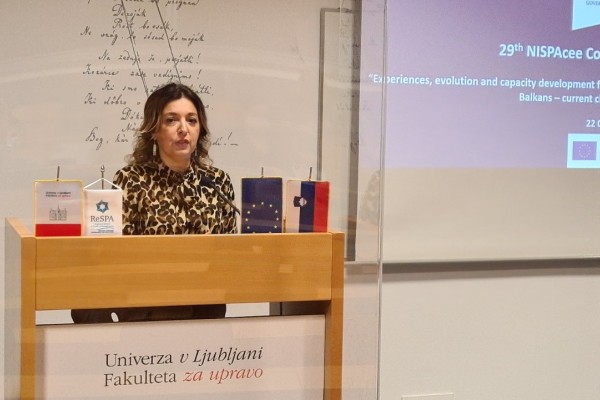
ReSPA Panel at the 29th NISPAcee Annual Conference
ReSPA organized the Panel at the 29th NISPAcee Annual Conference "Citizens' Engagement and Empowerment - The Era of Collaborative Innovation in Governance" devoted to a presentation of the main developments of the utilization of Regulatory Impact Assessment (RIA) in the policy cycle and legislation preparation within Western Balkan administrations.
ReSPA Director, Ms Ratka Sekulović, contributed to the panel discussion and made a resumé of the Western Balkan state of play in the domain of Better Regulation (BR), by providing a quick overview on European Commission findings related to this area and presenting ReSPA current and future actions in the domain of Better Regulation and regulatory reform.
Sekulović put a special emphasis on the public consultation and engagement of citizens in these processes and briefly presented the different modalities and state of the art for conduction of RIA and public consultations. She also emphasized the necessity to improve the RIA systems and implementation through strengthening the regulatory and methodological frameworks and importance of the RIA process (short term) to ensure transposition and implementation of the EU Acquis taking into account that transparent processes can be monitored.
Representatives from ReSPA Member administrations as well as OECD/SIGMA were also part of the panel. They highlighted the importance of the RIA and EU integration process (long term) by building an administrative culture and system of decision-making based on evidence, creating a responsive administration used to interact with key stakeholders, preparing for the formal role in the EU decision-making process before EU accession takes place. They also paid attention to Public and stakeholder consultation: how can the administrations in the region boost public and stakeholder consultation and what is the role of civil society organizations in these processes.
Finally, panellists concluded that there is a necessity to strengthen the mandate and capacities of RIA oversight and quality control bodies as well as the final quality check as well as the necessity for capacity development in the Western Balkans administrations related to evidence-based policymaking, impact assessment, and public consultations.



